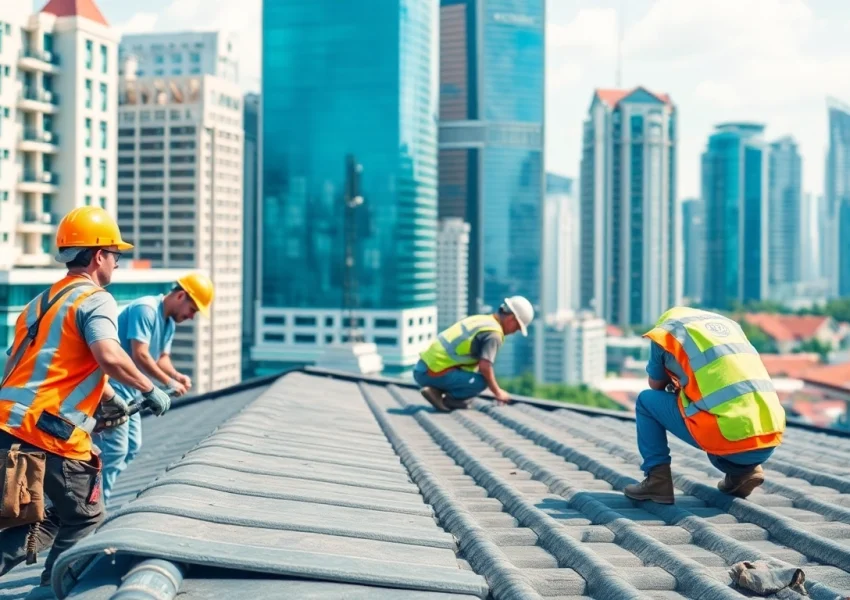Understanding the Importance of Electrical Panel Upgrade
In our increasingly electrified world, the demands on domestic electrical systems continue to grow. From heating and cooling to energy-hungry appliances, homes are consuming more electrical power than ever before. To meet these demands efficiently and safely, an Electrical Panel Upgrade becomes essential. This upgrade is not merely a structural adjustment; it significantly impacts the performance and safety of your entire electrical system.
Why Electrical Panel Upgrade Matters
The electrical panel is often described as the brain of your home’s electrical system. It controls the distribution of electricity throughout your home, ensuring that each circuit receives the proper amount of power. As the appliances and devices we use evolve, so too must the systems that support them. An upgrade can mean the difference between efficiency and risk, between compliance with safety standards and potential hazards.
Common Reasons for Upgrading
There are several common reasons that may prompt a homeowner to consider upgrading their electrical panel:
- Increased Power Requirements: Upgrading often occurs due to the addition of new, high-wattage appliances, such as electric vehicles or modern HVAC systems that consume considerable electricity.
- Outdated Circuit Panel: Older panels may not support the required load capacity, especially in homes that were built several decades ago.
- Safety Improvements: Newer panels incorporate advanced safety features that reduce the risk of electrical fires and shocks.
- Home Renovations: Significant renovations or remodeling projects may require an upgraded electrical panel to handle additional circuits.
Potential Risks of Not Upgrading
Neglecting to upgrade your electrical panel can lead to several risks:
- Electrical Fire: Overloaded circuits or faulty panels can spark electrical fires.
- Equipment Damage: Insufficient power can lead to decreased performance or damage to appliances and electronics due to fluctuations in power supply.
- Inconsistent Power Supply: Circuit breakers may trip frequently when overloaded, leading to inconvenience and potential safety hazards.
- Code Violations: Outdated panels may not comply with current electrical codes, which could cause issues when selling your home or during inspections.
Signs You Need an Electrical Panel Upgrade
Identifying Overloaded Circuits
One of the most evident signs you need an upgrade is the frequent tripping of circuit breakers. If multiple breakers are tripping regularly, it’s a clear indication that your panel may be overloaded and unable to handle the total electrical demand in your home.
Flickering Lights and Appliances
Flickering lights, dimming appliances, or unusual noises from the panel (such as buzzing) can indicate inconsistent power flow. These symptoms often suggest that your electrical system is struggling to keep up with demand, making an upgrade necessary to ensure stability and safety.
Age and Condition of Current Panel
As a rule of thumb, if your electrical panel is over 25 years old, it may be time to evaluate its efficiency and safety features. Older panels may use outdated technology that doesn’t adequately protect your home. If your panel exhibits rust, burn marks, or other signs of damage, an upgrade is crucial.
Costs Associated with Electrical Panel Upgrade
Estimating Your Upgrade Costs
The cost of an electrical panel upgrade can vary widely, depending on several factors, including the type of panel, the labor involved, and any additional upgrades needed. Homeowners can expect to pay anywhere from $800 to $4,000, with the national average being approximately $1,800. While this may seem high, it is a critical investment in both safety and functionality.
Factors Influencing Pricing
Several factors can influence the overall cost of your electrical panel upgrade:
- Amperage Rating: The kind of panel you choose, generally ranging from 100 to 200 amps, will significantly impact the total cost.
- Complexity of Installation: Homes with more complex electrical systems may see higher labor costs due to the additional time and expertise required.
- Location: Regional pricing can vary; urban areas often have higher costs due to demand.
- Permits and Inspection Fees: Depending on local regulations, you may incur additional costs for necessary permits and subsequent inspections.
Financial Benefits of Upgrading
While the upfront costs of an upgrade may seem daunting, the long-term financial benefits can offset the initial investment:
- Lower Energy Bills: An upgraded panel can improve energy efficiency, resulting in reduced monthly utility costs.
- Higher Home Value: A modern electrical system increases the resale value of your home, appealing to prospective buyers.
- Energy Efficiency Rebates: Many local utility companies offer rebates for upgrading to energy-efficient systems, providing additional financial incentive.
- Decreased Repair Costs: Investing in an upgrade can reduce ongoing maintenance and repair costs associated with older panels and systems.
Choosing the Right Professional for Your Electrical Panel Upgrade
Qualifications to Look For
When seeking a qualified electrician for your panel upgrade, consider the following qualifications:
- Licensing: Ensure the electrician is licensed and insured to perform electrical work in your state.
- Experience: Look for electricians with extensive experience specifically in panel upgrades and installations.
- References: Ask for references and check reviews from past clients to assess the quality of their work.
- Knowledge of Current Codes: A good electrician should be well-versed in the latest electrical codes and regulations.
Questions to Ask Potential Electricians
Before hiring an electrician, consider asking the following questions:
- What experience do you have with electrical panel upgrades?
- Can you provide a detailed estimate, including labor and materials?
- How long do you anticipate the work will take?
- Will you obtain the necessary permits for the job?
Importance of Getting Multiple Quotes
It is wise to obtain multiple quotes from different electricians before making a decision. This allows you to compare pricing, services offered, and projected timelines. Furthermore, multiple quotes give you a broader perspective on what to expect in terms of costs and common practices within your area.
Steps to Prepare for Your Electrical Panel Upgrade
Homeowner Checklist Before the Upgrade
Before beginning your electrical panel upgrade, take the following steps to prepare:
- Assess your current electrical demands and note any new appliances you plan to add.
- Contact your utility provider to inform them of the upcoming upgrade.
- Clear the area around your existing panel, ensuring ample space for the electrician to work.
- Discuss your upgrade plans with all household members to ensure everyone is informed of potential power outages during the work.
Necessary Permits and Codes to Consider
Electrical upgrades often require permits to comply with local codes. Be aware of the following:
- Inquire about local regulations that govern electrical installations in your area.
- Work with your electrician to ensure all necessary permits are obtained before the project begins.
- Understanding local codes will help ensure safety and compliance, potentially preventing future liability issues.
Post-Upgrade Maintenance Tips
After upgrading your electrical panel, follow these maintenance tips to keep it in optimal condition:
- Regularly check for any signs of wear or damage, such as burn marks or rust around the panel.
- Stay vigilant for tripped breakers or unusual noises coming from the panel, addressing issues promptly.
- Schedule periodic inspections with a qualified electrician to ensure everything is operating correctly.
- Become familiar with your new electrical system, including the labeling of circuits to facilitate easy troubleshooting.






